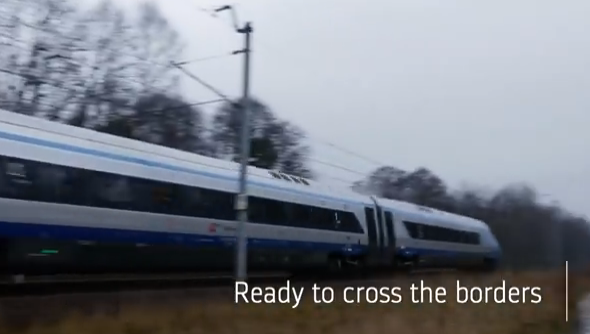How €93 million of EU money prevents Polish trains being used EU-wide
Polish Railways PKP has just launched its Pendolino EIC Premium service - a fleet of brand new, 250km/h capable Alstom trains that connect Gdansk, Warsaw, Wroclaw, Katowice and Krakow. The trains are the first capable of speeds greater than 200km/h in central and eastern Europe, and were hence launched with some fanfare. Alstom even has a swanky video about them here.

Yet one frame of the video, shown here, caught my eye "Ready to cross the borders" it says, and the technical specification of the trains means they could run on German, Czech and Slovak electrification systems as well as Poland's. But a line in Railway Gazette's story about the launch caught my eye:
However, certification for international operation is not seen as a priority, as the trains are restricted to domestic services for an initial 10 years under the terms of a grant from the EU Cohesion Fund which covered 22% of the project cost.
Could this, I wonder, really be true? EU money obliging PKP to use the trains only on national routes? Isn't that contrary to all of what the EU stands for, trying to foster cross-border cooperation?
The sad answer is yes, this is indeed true, but the story is a little more complicated than Railway Gazette explains.
€93 million was indeed granted to PKP IC for the purchase of the 20 Alstom trains, contributing 22% of the purchase cost of the 20 trains and the maintenance depot. However EU Cohesion Funds are normally allocated only for infrastructure, or for regional rolling stock. These PKP trains were to be deployed on long distance InterCity routes. This meant that the €93 million Cohesion Fund grant (from DG REGIO) was classed as State Aid by the European Commission's DG Competition, as explained in DG Competition's press release here.
This press release led me in turn to the competition case that can be found here, and specifically this PDF that explains the Commission's reasoning. The important paragraph is this one:
- The Commission considers that, because of the targeted nature of the investment aid, the aid does not compromise the effective opening of the international passenger transport market and cabotage following the entry into force of the third railway package.
Basically DG Competition is arguing that if these trains were deployed on international routes, the state subsidy for their purchase would distort the international railway market that is theoretically open to competition. Deploy them in Poland, where the argument about territorial cohesion can be applied to justify the grant, and this is OK. Of course there is currently not a single long distance international line to or from Poland where there is any competition in passenger rail.
So there you have it. The European Union, as a criterion for granting Poland €93 million for new high speed trains, prevents these trains being used internationally. This comes of course at the same time as Berlin - Wroclaw cross border services have been axed, and the EU is funding ghost airports in Poland.
I despair.
(oh, and as if that were not absurd enough, the new trains don't even have wifi!)